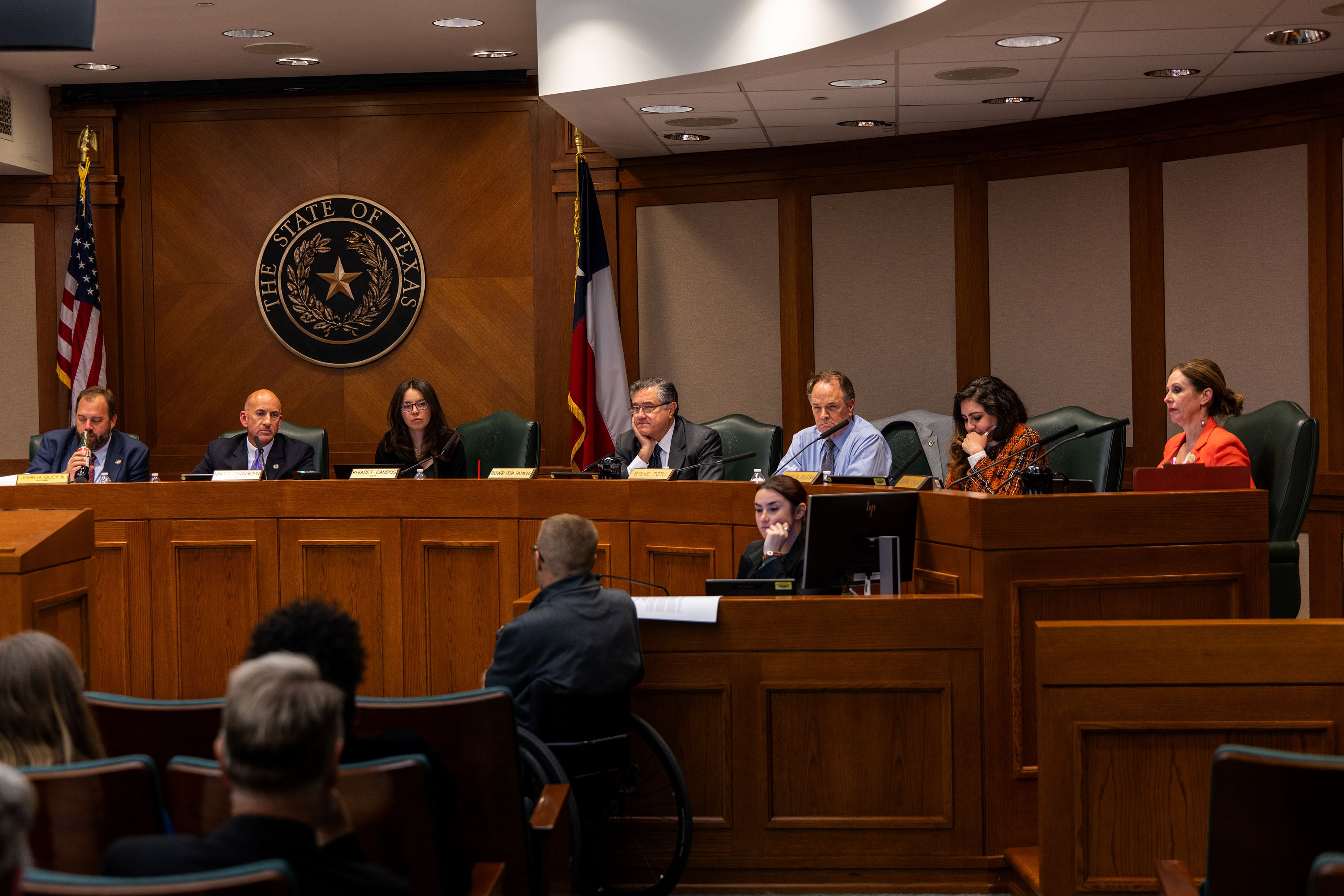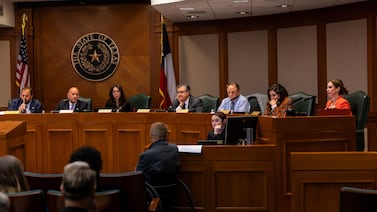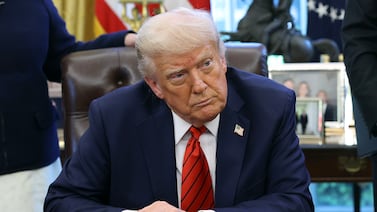Votebeat is a nonprofit news organization reporting on voting access and election administration across the U.S. Sign up for Votebeat Texas’ free newsletter here.
Democratic lawmakers and Texas voters spent nearly four hours at a legislative hearing Thursday demanding to know how a GOP-backed bill to require citizenship proof from voters would work, and warning that it could disenfranchise eligible Texans.
Houston voter Jacqueline Altman told members of the House Election Committee that it recently took her two days to obtain a copy of her birth certificate from the county, a process that required her to miss work to sit in county offices.
“When decisions are being made about these kinds of documentation, I ask that we take all of that into consideration.” said Altman, one of around a dozen Texans who testified in opposition to the bill.
House Bill 5337 goes further than the laws and proposals in some other states, in that it would apply retroactively to already-registered voters in Texas, not just new applicants. Texas has more than 18 million registered voters.
Officials with the Texas Secretary of State’s Office told lawmakers Thursday that they estimate around 500,000 currently registered voters who don’t have a driver’s license number or Social Security number in their voter registration record would have to provide proof of citizenship.
That group could include many people who registered before the early 2000s, when federal voting laws began requiring people obtaining state-issued IDs or driver’s licenses to provide proof of citizenship or lawful presence in the U.S. Election officials said many are likely elderly.
How big a problem is noncitizen voting in Texas?
HB 5337 is identical to Senate Bill 16, which passed the state Senate along party lines and with little debate earlier this month. The House version of the legislation is co-sponsored by 50 Republican lawmakers.
The legislation is modeled after an Arizona law that requires proof of citizenship to vote in state and local elections. The Texas legislation would also bar voters who don’t provide citizenship proof from voting in presidential elections; a similar restriction in Arizona has so far been blocked by federal courts.
The Texas bills would also require local election officials to continually check the citizenship status of voters on their rolls — and subject the officials to potential felony charges if they lapse. In Arizona, a state error tracking proof of citizenship recently left election officials struggling to consistently administer the requirement.
Republican lawmakers in Texas have for months been responding to a nationwide GOP campaign to raise alarm about the threat of noncitizen voting, even though available evidence shows it is extremely rare.
In December, the Texas Secretary of State told the Legislature that in 2024, election officials cancelled 63 registrations for noncitizenship and 124 for failing to respond to a notice requesting proof of citizenship. Voters who failed to respond to a notice could still be citizens.
During Thursday’s Elections Committee hearing, state Rep. Carrie Isaac, a Dripping Springs Republican leading the push for the House version of the legislation, said the goal is to prevent all noncitizens from registering to vote.
Isaac cited an announcement by Gov. Greg Abbott last fall that 6,500 noncitizens had been removed from Texas voter rolls prior to 2024. An investigation by Votebeat, Texas Tribune and ProPublica found Abbott’s numbers were inflated and, in some instances, wrong.
In a span of three years, the state actually removed 581 people as noncitizens. The remaining 6,000 or so were people who had failed to respond to a notice asking to confirm their citizenship, which doesn’t mean they weren’t citizens. The investigation indeed found that some eligible citizens had been flagged as potential noncitizens and removed from the rolls.
State Rep. John Bucy, a Democrat from Austin and vice chair of the Elections Committee, described the data Isaac cited as “misleading” and pointed out that election officials already check the rolls for potential noncitizens.
“The system we have is working,” Bucy told Isaac. “We’re catching people. We’re cleaning the rolls, and they’re not voting.”
Isaac said the number of documented cases of noncitizens voting “may seem small” but said there was no reliable way to measure the scope of it “because the current system doesn’t require documentation of citizenship.”
The bill would cost state officials nearly $2 million over the next five years to implement, according to the bill’s fiscal note. That number doesn’t include the costs for local election officials.
Some Texans don’t have access to citizenship documents
Research suggests that lack of accessible citizenship documentation could be a more widespread issue than noncitizen voting.
In Texas, Republicans are more likely than Democrats to lack documented proof of citizenship, a 2024 study by the Center for Democracy and Civic Engagement at the University of Maryland found. One percent of Republicans do not have it, the researchers found, and 7% cannot easily access their documents, while nearly all Texas Democrats have documented proof, and 4% cannot easily access it.
The study also found that younger Texans are three times more likely to have trouble accessing their documented proof of citizenship than older Texans.
Under the legislation, voters could fulfill the requirement by providing any of the following:
- a copy of a U.S. passport;
- a passport card;
- a certified copy of a birth certificate issued by a U.S. state or territory;
- “United States citizenship papers”;
- identification issued by the U.S. agency responsible for citizenship and immigration; or
- for citizens born outside the U.S., a consular report of birth abroad.
Anyone who shows up to the polls who has yet to provide proof of citizenship will have six days to provide it in order for their full ballot to count. If a voter does not provide it, only the votes in congressional races will be counted.
The list of accepted documents does not include tribal documents, which Arizona does accept. Cecilia Flores, the tribal council chairwoman for the Alabama-Coushatta Tribe of Texas, which is located in East Texas, asked lawmakers Thursday to include tribal documents in that list. In Arizona, a Votebeat analysis found voters living on tribal land were more likely to wind up on the federal-only voter list, signaling they may struggle to provide citizenship proof.
“While many of our tribal citizens may possess a proper birth certificate, my mother was born in 1928 and I have never seen her birth certificate,” Flores said.
Bucy asked Isaac and other Republicans on the committee to consider amendments to the bill that would expand the type of acceptable IDs and documents.
The House bill was left pending Thursday. The House and Senate must both pass the same version of the legislation, which would then go to Abbott for his signature.
Natalia Contreras covers election administration and voting access for Votebeat in partnership with the Texas Tribune. She is based in Corpus Christi. Contact Natalia at ncontreras@votebeat.org.






